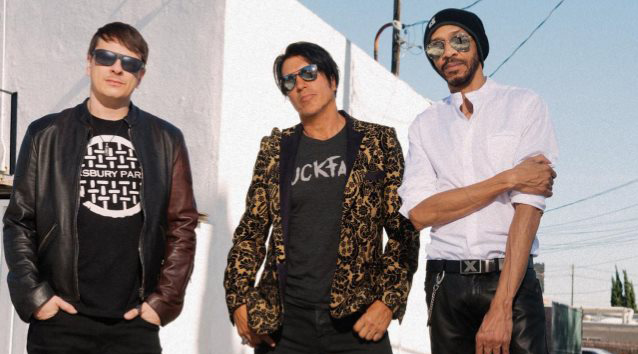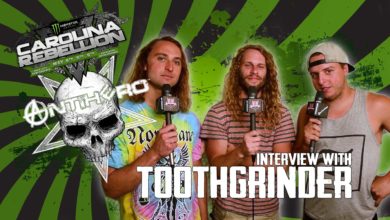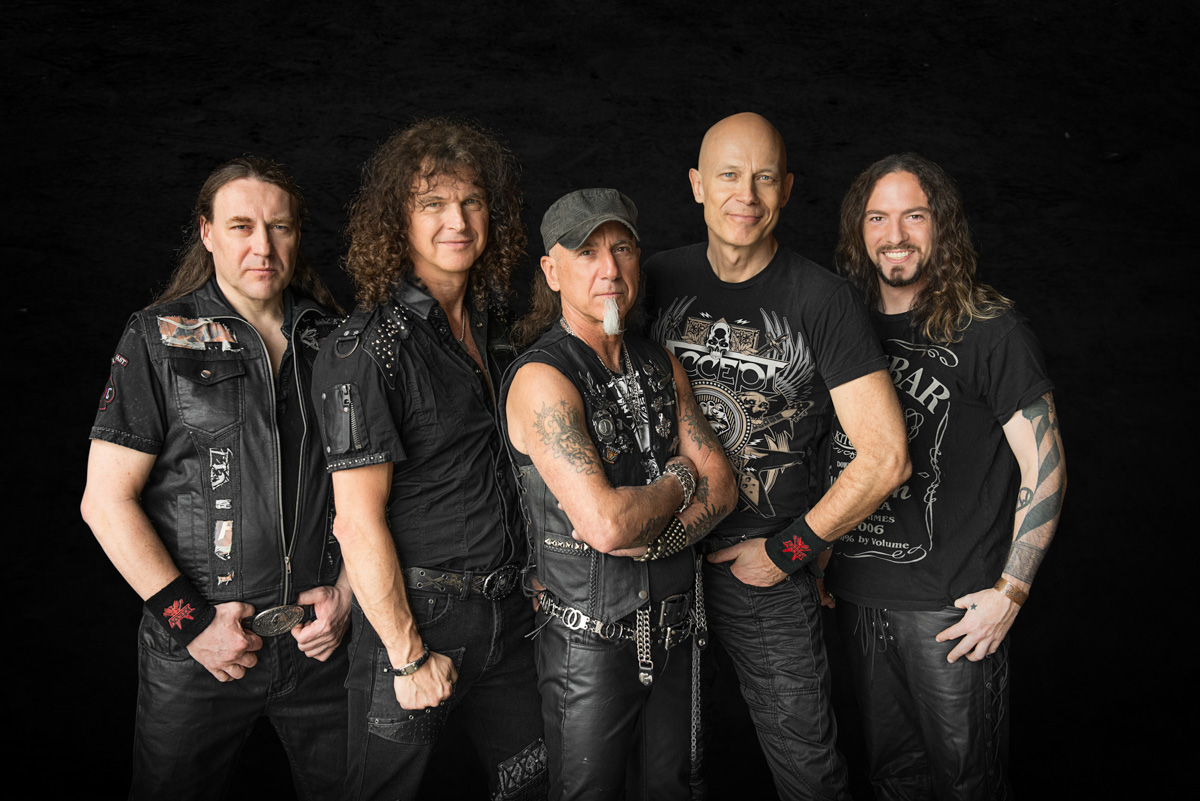Far from resting on his multi-platinum laurels, George Lynch is one of the busiest and most prolific musicians out there. His numerous and varied musical projects, from past to present, including KXM, Lynch Mob, Dokken, Sweet & Lynch, and others, show a legendary guitarist still pursuing excellence and evolution within his work. My recent conversation with George was very deep, and “non-rock” at many points which was very refreshing and inspiring at the same time… [spreaker type=player resource=”episode_id=11750199″ theme=”dark” autoplay=”false” playlist=”false” cover=”https://d3wo5wojvuv7l.cloudfront.net/images.spreaker.com/original/210019ea5549c7d5dfc96f3007faef17.jpg” width=”100%” height=”150px”]
[on KXM]… “I felt in my core that this was something that could potentially be really profound on an internal, personal level. These are all super, super, serious cats. Not that everybody I play with isn’t, but this just resonated on a different frequency for me that I felt compelled to really make that extra effort to push through the normal constraints of just practical limitations of being able to do something like this, and put it together with everybody’s personal situations and busy schedules.”

Tom Leu: Thanks so much for taking a few minutes with me today, George.
George Lynch: Thank you, I like the name of your magazine, it’s interesting.
Tom Leu: Yes, AntiHero Magazine, thank you, glad you like it. I’m going to circle back around to that in a little bit. I’ve been following you for years, and really appreciate all the music you have, and continue to put out with all of your numerous projects, including the latest KXM album, Scatterbrain, coming out on March 17th on Rat Pak Records. George, to me, this album is darker, and heavier, and I’m going to say as well, hookier, than the first KXM album. I think that’s a pretty difficult thing to pull off. It’s definitely a more diverse record. I know you guys [dUg Pinnick, bass guitar & vocals and Ray Luzier, drums] don’t go in with any pre-production, or a bunch of songs already written. You go in, and you let it happen organically. Was this evolution of the band expected? Did you want it to happen that way, or is that just kind of the way it went?
George Lynch: We did have a conversation after the first record, and talking about how we’re going to go forward, and about how we were going to do that. I think we were thinking we might want to play it a little safer the next time and go in and do a traditional record, with pre-production and a producer, and put some more thought and time into it just to be safe. Of course, in the end, we didn’t do that, and I’m glad, I know we’re all glad that we didn’t do that. Ray [Luzier] is usually the voice of reason; pretty clear headed, and he pretty much just decided, “Listen, this is what we are, and we got to have faith in what we do, and each other. It’ll be fine.” And he was right.
Tom Leu: When you guys go in there, and you know that there’s not a lot of preparation in advance, and that the tape is rolling, does that add an extra layer of pressure to you or the others, or is that just what you do?
George Lynch: Well, a little of both. I think it’s a healthy amount of pressure that keeps us motivated, and we don’t have extra time to sit around and goof off, and go take long lunches with a couple extra margaritas [laughs]. We’ve got to stay working; every moment of time is utilized very effectively. If something wasn’t working, we didn’t spend a lot of time on it, or get stuck on it. We just moved on and switched gears. Because we were all very aware that we had very little time, and we had to. We did have a certain amount of pressure to best ourselves and outdo the first record.
Tom Leu: Do you prefer going in the way you do with KXM records, letting it happen organically, unprepared if you will, without songs already written, versus going in with song ideas and tracks ready to go and a specific direction? Do you prefer one over the other? Or do you like the variety and the diversity of the different processes?
George Lynch: I like doing it both ways. They’re both great. For KXM, that’s what works for us, and that’s kind of our shtick, you know? I’ve done other records very similar to that. The Shadow Train record, even some of the Lynch Mob stuff is done that way. Sound Mountain Sessions was done exactly like that actually, in the same studio that we did the first KXM record; it’s how we got the idea to do it that way at that location.
I come from a time… my early bands were all done like that. Even our gigs were like that; everything was improvised. We had a framework when we’d go out and play shows back in my younger days. [We’d play] like the sock-hops and the battle of the bands, the high school gigs, and the backyard parties and stuff… They were important gigs, but they were two-thirds improvised, like truly improvised. Actually, I’m very interested in Jam music because I come from that, and I listen to Jam. So-called Jam bands, for the most part as far as I can tell, they’re just jamming in the context of pre-structured architecture. There’s not any real, complete improv going on like in a Jazz band or Hendrix or something. They already have something and they’re just kind of working around it. I’m just like, “That’s not a Jam band, as far as I’m concerned.” Jam bands are when you’ve got absolutely no safety net, and go out there, and somebody throws something out there and everybody picks it up and you go with it… wherever it goes.
Tom Leu: It sounds like you were real driving force behind making KXM a reality. Why was this band so important for you to get off the ground George, and not something that was a good idea on paper?
George Lynch: Because I felt in my core that this was something that could potentially be really profound on an internal, personal level. These are all super, super, serious cats. Not that everybody I play with isn’t, but this just resonated on a different frequency for me that I felt compelled to really make that extra effort to push through the normal constraints of just practical limitations of being able to do something like this, and put it together with everybody’s personal situations and busy schedules. I knew that it was going to require a Herculean effort to make it a reality. Even then it was going to be hard to pull off.
Tom Leu: I know touring is always a challenge when you have guys in other busy bands like KoRn and King’s X. I believe I read Ray suggested the possibility of you guys getting a different drummer, so KXM could go out and tour, and that kind of got icksnayed, is that correct?
George Lynch: Perfectly stated, yes. That was actually a recent development. It’s something that had been thought of before, and it’s usually Ray bringing it up, because I think he feels bad, which he shouldn’t, because we should actually look at this like we should be thankful that we have the opportunity to do two records together, if nothing else. We would tour if the record gets to the point, or succeeds to the point where it’ll force us to tour.
Tom Leu: That would be a good problem to have then, to have to adjust the schedules. George I hear you use the word ‘evolve’ and ‘evolving’ a lot in interviews with respect to music, and not just that, but art and being a human being. How important is that concept of evolving to you today as an artist, in all of your various musical projects?
George Lynch: I don’t know if… everything’s obviously connected, but I really have tried to find a way in my creative life to blend my personal world-view and belief systems with my music, and have my music be sort of a voice for things I care about. I haven’t been very successful with that, and that’s been very frustrating. I think the closest I’ve gotten to welding those different aspects of what I do together has been Shadow Train, where I was very heavily involved in writing every aspect of that record, including the melodies and the lyrics and the messaging. KXM is not that… KXM is a very democratic process; we’re all equally involved. It’s very little… just enough ego that is necessary for us to do what we do. We’re prideful in our abilities, and that’s healthy… not in any kind of destructive way. As far as the messaging in KXM, because dUg holds the microphone, and has the power of the pen, there is some political messaging coming through there. I don’t agree with some of it, so there’s that, but I let it go, because you know what, I’m not the singer.
Tom Leu: That’s an interesting statement… because I know you have another project with Michael Sweet [from Stryper], called Sweet & Lynch, and are currently working on a second album to be coming out later this year. Certainly, you two guys don’t share entirely the same world-view on a lot of different aspects, spiritual and otherwise. Is that a similar phenomenon there when you’re working with someone like him, and perhaps don’t see eye-to-eye philosophically on things, but yet creating music together?
George Lynch: Well, I vacillate between different points of view on that subject. To me music is potentially, a very powerful force, inarguably. I grew up in an era where it changed the world in the late 60’s, early 70’s. I think creative people have a responsibility to do that, to use their art for good. On the other hand, sometimes it’s just work. And on a third level, sometimes it is just what it is and I appreciate it for what it is. Using Sweet & Lynch as an example, there could potentially be a conflict there between Michael and I, and we’ve talked about that. I’m sort of a freethinking atheist, and he’s a born-again Christian. I’ve been through that in my life; I was a born-again Christian at one point. I was the guy knocking on your door handing out tracks. I played in a Pentecostal charismatic band that did revivals… tent revivals in black neighborhoods in South Central L.A., yeah, all kinds of stuff. I definitely have something to say about all that, but I don’t know how effective I am at it. I’m not Rage Against the Machine, I wish I was.
Tom Leu: I’ve heard some other interviews with you George where you seem to enjoy on occasion, getting into these philosophical debates at times. Do you enjoy talking about that deeper stuff, and is that some of the lyrical content that you possibly want to delve into more going forward in some of your other projects?
George Lynch: I did for many years aspire to do that, off and on. I’m at a point in my life right now where I don’t feel as compelled to confront things I don’t agree with. I’m not sure why, I think partly because Shadow Nation exhausted me, the process of making that film and that record, took a lot out of me… took a lot of wind out of my sails. I mean my beliefs are just as strong, and I think as valid as they always were, but my compulsion to change the world by myself has been diminished. I said a lot and I sort of emptied the bowl, and now I’ve got to replenish it. Music is my way of replenishing myself.
Tom Leu: Sounds good, and it makes sense. I read a quote you’d said a couple of years back in an interview: “I’m also a student of human nature, it interests me how people interact and how we sort of conduct ourselves and manages ourselves in groups, communities, nations, and so forth. A band is a group that is a good model for that. You see how people work with a natural versus an imposed hierarchy.” Fascinating stuff, I happen to share that world-view with you which is why I’m spending some time on it here today. How important is it to be a student of human nature when you work in bands and musical outfits, as you’ve been doing for the better part of 40 years?
George Lynch: I honestly don’t know if it does any good. That’s the thing about a lot of this stuff when you’re thinking about things a little deeper than the surface, and you’re going a little deeper than the surface, and you’re sort of wondering… I think you have to step back and ask yourself, “Why?” It’s almost… I guess an analogy I could make is comparing a completely evolved civilized, intellectual person that’s connected, wired, and everything in the 21st century, to a person living an indigenous life with thousands of years of sort of evolving in the natural world, and being closer to the natural world. Does one person know anything more than the other that’s essential? You know what I mean? Think about, I actually went back to school and studied philosophy and other things, and at the end of the day I was like, “Okay, well, how much of this am I really…?” Listen, we all need to question ourselves and know who we are and our place on the earth in relation to each other and so forth. But beyond that, I wasn’t looking in the paper, in the want ads, and finding anyone looking for philosophers.
Tom Leu: So, did you end up with a degree in philosophy of some sort then George?
George Lynch: No, no, no, it was just sort of self-edification. It was just kind of an extension of reading basically is what it was. It was really a frustration.
Tom Leu: You’re right… I haven’t seen too many jobs out there for philosophers in the want ads.
George Lynch: The only job you can get as a philosopher is teaching.
Tom Leu: You mentioned earlier that KXM is a democracy. You’ve also talked previously that you had tried democracies and equality in Lynch Mob, and concluded that it didn’t work, and that perhaps benevolent dictatorship is the way to go. How come it works in KXM then?
George Lynch: Exactly, I mean I guess that was a rhetorical question. It depends on your environment; it depends on the people you’re working with. I guess another example would be… think about communes, back in the late 60’s and early 70’s. Experiments in communal living and why they never worked, despite our best aspirations and hopes and dreams, betting on the goodness of human nature, but they never worked. I think that’s because, for it to work, for a pure democracy to work, where everybody does the right thing, everybody has to do the right thing, and that’s just doesn’t conform to human nature. Because it only takes one bad apple to upset that apple cart, and then the whole thing falls apart like a house of cards in the wind. I’ve been reading some scientific data, just on the surface in the last couple of years. It seems to comport to my instinctual idea that there’s just basically two kinds of people… we’re wired one of two different ways, and that’s reflected in our political divisiveness, and in our economies, and just when you look at the planet, you just look at history, and look at people that you know. You know that you just cannot get through to each other. You’re just diametrically opposed like polar opposite magnetic forces. No magical new speak is going to permeate that barrier, it just isn’t. I think it’s just a matter of wiring.
Tom Leu: A matter of wiring…. a temperament that cannot be changed, right?
George Lynch: They really have scanned people’s brains with these different belief systems, these different world-views, and there is, the pre-frontal cortex is activated in completely different ways depending on how you think politically, and how you feel as far as empathy, which is housed in your pre-frontal cortex. I mean you’re empathetic and compassionate, or you’re not. You’re a pull yourself up by your own bootstraps kind of person, or you’re a community kind of person, where we take care of each other. And I think that’s why we have “succeeded,” or at least propagated as a species throughout history as an organism, is because we are altruistic versus looking out for ourselves. Historically in the long run…
Tom Leu: But people are capable of changing their belief systems though. As you mentioned, you used to subscribe to a certain belief system, and today you don’t. That evolved. Is that a different layer of these two types of individuals that you’re talking about then?
George Lynch: No, because I wasn’t a non-compassionate, non-caring, non-altruistic person. I thought I was helping people by trying to bring them to Jesus. That’s just been a matter of educating myself and exposing myself to larger ideas, and changing as people all do obviously through the course of their lifetimes. On a molecular level, biologically, we’re obviously not the same person at 70 than we were at eight. You know?
Tom Leu: Correct, which is why you’d also mentioned too about evolving as an artist. You can’t write the music that you wrote 30 years ago. Although fans may want to put you in a box that way as an artist and say, “Be that same guy you were in ’87,” but it’s 2017 and that’s not possible anymore.
George Lynch: It’s interesting, I was hired to do something like that, and I just assumed it would be easy. And I hadn’t thought about the fact that you know, I haven’t really played that kind of music genuinely, meaning being organically, in 25 years or however long it had been. This was probably like maybe seven, eight years ago that this happened. So, I went into the studio with these people that were paying to be George Lynch of the 80’s, and write this song and play these solos, and have that sound. It was the only time I can think, in the last few decades, where I utterly failed. I mean utterly, completely, shit the fucking bed. The people that hired me, during the session, because they paid for the studio and everything, they basically… I got out of the chair and I just stayed, they kind took over. They were all guitar player-musicians, they ended up doing it, and I ended up just sitting there. Really embarrassing and strange, and I felt really bad.
Tom Leu: But it was a learning experience obviously.
George Lynch: Yeah, I gave them… I felt like I couldn’t take their money, but I felt disappointed in myself. Not disappointed, but it was just strange to me, it was eye-opening that I just assumed that I could always do that, that it’s easy. “Oh, I could always do 80’s music, that’s dumb.” I was doing all this other stuff that I was thinking was better than that, but it wasn’t what they wanted.
Tom Leu: Were you surprised at how well the Dokken reunion went last year? Or did you expect it to go smoothly?
George Lynch: Well, it wasn’t… I wouldn’t call it smooth, that wasn’t the right word. It was a lot of work, we were kind of just thrown into the maelstrom. We didn’t really prepare like we should’ve. It was kind of put together a little strange. I think we would all agree to that. We were all starting to talk about that recently about how we were just kind of, kind of did it backwards. But despite all that, when we were up there playing, for the most part, it was the same band that we were 30 years ago, same personalities. I mean, you saw us all looking at each other, and we’re in a room, a dressing room, we’re hanging out whatever at the hotel and it’s funny how nothing had changed. We’re all just the same distinct, funny personalities. And, both on and off stage, it was great. Ideally, it would be nice to rehearse it a little more if we do it again, get a little tighter, and try to figure it out, but it was cool for what it was.
Tom Leu: The jury’s still out on whether there will be any more of that then, is that correct at this point?
George Lynch: Yeah, I think there will be something else out. It’s just, we’re letting it lie for right now, we’re working on the DVD and the live album. We wrote a new song and remakes of some older songs. There’s talk of some stuff. Not a lot of stuff, but of some stuff here and there, one-offs, early next year.
Tom Leu: Okay, last question for you George… What’s a question that maybe you never get asked in interviews, but wished you did?
George Lynch: I’m going to be quite candid with you, this has been an interesting interview because you did ask all those questions about how music relates to the larger world of ideas, and politics, and historically as an art form. How it’s important in the context of humanity versus just listening for the appreciation of the art itself, which is super valid and important and wonderful. But you never get asked that, and I get frustrated with that sometimes, and not to… I don’t want to bag on anybody here, but there was a show on TV for a while that was a rock TV show, which is something kind of cool that would be nice to have. But in that show they never did that, what you just did. They never talked about anything that was important. Really frustrated me, and I thought: “You’re kind of missing the whole point.” There’s an opportunity to edify our audience, and get our audience involved in something larger, and in a way, guide them to be better people, and more involved you know… right?
Tom Leu: Exactly. I’m so happy to hear that, and that’s one of the reasons I was really looking forward to talking with you. Because in my research, with what you’re about, and what I think you’re about based on what I’ve seen out there at least, I was looking forward to talking to you about this very stuff. Even more so than just some of the day-to-day [music business] stuff if you will… I hope you appreciated that, and enjoyed that part of our conversation today, because I did.
George Lynch: Well, I thought this was going to be a ten-minute interview, and I could talk all day to you because I think this is, I’m very inspired right now to explore these ideas. That’s why when we first got on the phone, I was questioning the name of your publication. I love this… The shirt I’m wearing on the KXM promo shots says, “Fuck fame.” That’s sort of along the same lines.

Tom Leu: Yes, absolutely. Well, AntiHero Magazine, that’s part of the idea behind it, it’s just… we glorify a lot of things of course, and shine a light on a lot of things, but for me at least personally, what’s the bigger issue? What’s the bigger motive? What’s the greater good that we can possibly provide? On the [Sound Matters] radio show that I do, that’s what I talk about and mix that kind of stuff in there. I want to have a more intelligent conversation about these things; raise it to another level, and I really appreciate you and talking to you today about this. I could talk to you about this for a lot longer as well, and perhaps you and I can again down the road here at some point.
George Lynch: Well, I’ve got enough records coming out. Every one of those records is an opportunity for us to do this again.
Tom Leu: All right, I’m going to make sure that we do. I know that you’ve got Ultraphonics and Lynch Mob coming up. And then Unimog is going to be coming down the line as well.
George Lynch: Yeah, and we’ve got Sweet & Lynch… And Unimog… we’ve also changed the name of that to The Banishment.
Tom Leu: Oh, okay.
George Lynch: So yep, we’ll have plenty of opportunities. I don’t know if Kevin will be involved in all those, but…
Tom Leu: One way or another, I’ll track you down George and find you, and get another conversation going. Maybe we can do part two of this then going forward. I really do appreciate your time today, and for talking with me so openly about all this stuff.
George Lynch: All right. Well, I appreciate you going there with me, and let’s keep it going, let’s keep the dialogue going.
Tom Leu: You got it George. Very much appreciate it, will do. Thank you. Have a good day.
George Lynch: Talk to you later, bye-bye.









